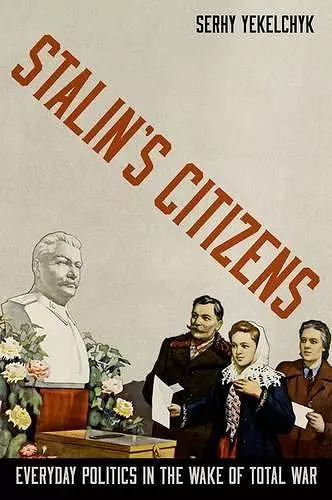Stalin's Citizens
Everyday Politics in the Wake of Total War
Format:Hardback
Publisher:Oxford University Press Inc
Published:25th Sep '14
Currently unavailable, and unfortunately no date known when it will be back

The first study of the everydayness of political life under Stalin, this book examines Soviet citizenship through common practices of expressing Soviet identity in the public space. The Stalinist state understood citizenship as practice, with participation in a set of political rituals and public display of certain "civic emotions" serving as the marker of a person's inclusion in the political world. The state's relations with its citizens were structured by rituals of celebration, thanking, and hatred-rites that required both political awareness and a demonstrable emotional response. Soviet functionaries transmitted this obligation to ordinary citizens through the mechanisms of communal authority (workplace committees, volunteer agitators, and other forms of peer pressure) as much as through brutal state coercion. Yet, the population also often imbued these ceremonies-elections, state holidays, parades, mass rallies, subscriptions to state bonds-with different meanings: as a popular fête, an occasion to get together after work, a chance to purchase goods not available on other days, and even as an opportunity to indulge in some drinking. The people also understood these political rituals as moments of negotiation whereby citizens fulfilling their "patriotic duty " expected the state to reciprocate by providing essential services and basic social welfare. Nearly-universal passive resistance to required attendance casts doubt on recent theories about the mass internalization of communist ideology and the development of "Soviet subjectivities. "The book is set in the Ukrainian capital of Kyiv during the last years of World War II and immediate postwar years, the period best demonstrating how formulaic rituals could create space for the people to express their concerns, fears, and prejudices, as well as their eagerness to be viewed as citizens in good standing. By the end of Stalin's rule, a more ossified routine of political participation developed, which persisted until the Soviet Union's collapse.
In this imaginative and meticulously documented study, Serhy Yekelchyk describes the world of 'civic emotions' in postwar Kyiv, in the process opening a window onto the lived experience of ordinary citizens. Written by one of North America's premier historians of modern Ukraine and the Soviet Union, this book makes a signal contribution to the historiography on late Stalinism as well as serving as a pioneering work on Soviet citizenship and the often all-encompassing world of public space and ritual within the Soviet Union. * Lynne Viola, author of The Unknown Gulag: The Lost World of Stalin's Special Settlements *
Stalin's Citizens presents a fascinating analysis of the public lives of ordinary men and women under Stalin. Serhy Yekelchyk's close examination of government ceremonies and public events reveals the communal fabric of Soviet society which amalgamated the political and the personal. * Hiroaki Kuromiya, author of Voices of the Dead: Stalin's Great Terror in Ukraine *
Using postwar Kyiv as his setting and privileging everyday practices of expressing Soviet identity rather than state policies, Serhy Yekelchyk makes discriminating use of the archival and published sources to detail and thereby reveal the performative essence and symbolic meaning of Stalinist citizenship. A work of profound insight and sophistication, yet accessible and always engaging, Stalin's Citizens is certain to generate spirited discussion and become required reading for anyone interested in understanding the Soviet way of life in the wake of total war. * Donald J. Raleigh, author of Soviet Baby Boomers: An Oral History of Russia's Cold War Generation *
Stalin's Citizens reaffirms Serhy Yekelchyk's reputation as one of the leading specialists on Ukraine under Stalin. His study of Soviet elections, holiday celebrations, Communist Party agitators and their campaigns joins a growing literature that explores the practice of politics and citizenship in authoritarian states, and highlights the role of public participation in rituals and the articulation of 'civic emotions.' It also challenges the emerging scholarship on 'Soviet subjectivities.' Stalin's Citizens is based on extensive work in still little researched archives in Ukraine. * Mark von Hagen, Arizona State University *
Both these very successful and enjoyable books deserve a wide readership among specialists in Soviet and post-1945 European history. Their fluent and accessible presentation, combined with the interesting questions they raise and the engaging material they deploy, make them very suitable too for students on higher-level courses. * Mark B. Smith, Slavonic and East European Review *
ISBN: 9780199378449
Dimensions: 155mm x 236mm x 28mm
Weight: 499g
288 pages